Freedom of information
What is freedom of information and why is it important?

The Freedom of Information Act 2000 allows members of the public and press to submit Freedom of Information (FoI) requests, which – if certain conditions are met – require public authorities to release any information they hold relating to the request. 34 Freedom of Information Act 2000, www.legislation.gov.uk/ukpga/2000/36/
This is important because it provides the public with the tools they need to hold the government to account over the decisions it takes and the way they spend taxpayer money.
The 'Your Right to Know' white paper which preceded the Freedom of Information Act began by saying that “unnecessary secrecy in government leads to arrogance in governance and defective decision-making”. 35 Cabinet Office, Your right to know: the Government’s proposals for a Freedom of Information Act, 1997, www.gov.uk/government/publications/your-right-to-know-the-governments-proposals-for-a-freedom-of-information-act The Act was designed to make government more effective.
Which organisations are covered by the Freedom of Information Act?
The Act covers central government departments and the executive agencies and public bodies they sponsor. It also covers parliament, the armed forces, devolved administrations, local authorities, the NHS, schools, universities and police forces.
Schedule I of the Act provides a full list of organisations covered. In 2013, companies that were wholly owned by the public sector or the Crown Estate also became subject to the Act.
Not covered by the Act are private and third sector organisations doing work on behalf of government, for example where a service has been contracted out.
How do you submit a freedom of information request?
Anyone can submit a freedom of information request. There are no restrictions on nationality, residency status or age. For a request to be valid, it must be sent directly to the relevant organisation, stating clearly what information is being requested and providing the requester’s real name with a valid address (postal or email) to which the reply can be sent. The Freedom of Information Act does not need to be cited in the request, but it is sometimes helpful to do so.
The Information Commissioner’s Office (ICO) website 36 ico.org.uk/for-the-public/official-information/ and WhatDoTheyKnow 37 www.whatdotheyknow.com offer further guidance and assistance in submitting requests.
Other ways to request information from public authorities include Environmental Information Regulation (EIR) requests, 38 ico.org.uk/for-organisations/foi-eir-and-access-to-information/guide-to-the-environmental-information-regulations/what-are-the-eir/ for environmental information, and subject access requests 39 Information Commissioner’s Office, ‘Your right of access’, [no date], retrieved 23 January 2024, ico.org.uk/for-the-public/your-right-to-get-copies-of-your-data/ for personal data an organisation holds about you.
What happens after freedom of information requests are submitted?
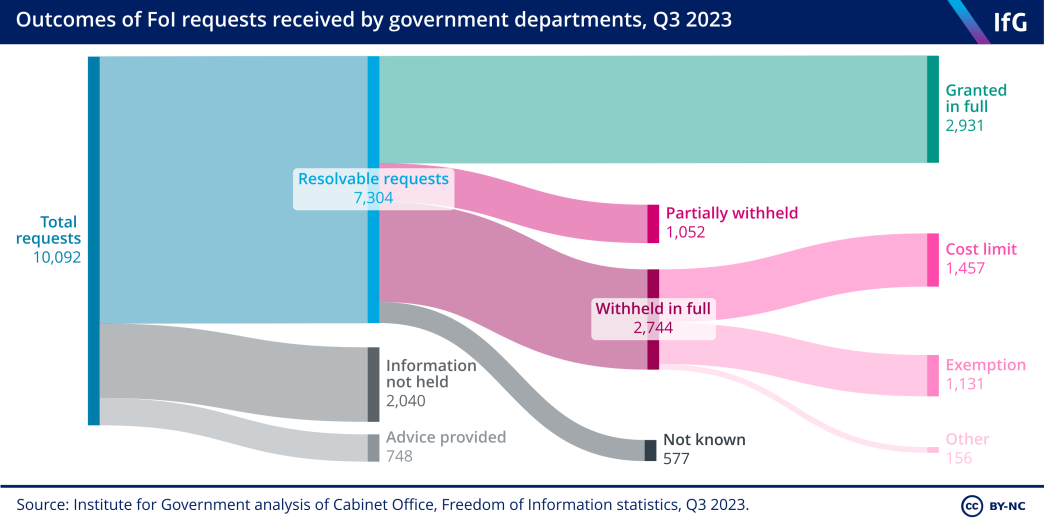
When freedom of information requests are submitted, the first thing a public authority must establish is if the request is ‘resolvable’, meaning the public authority holds the information that is being requested. It may also be the case that the request is unclear, in which case the public authority should provide the requester with advice on how to correctly formulate a request.
For resolvable requests, the public authority may choose to either provide all the information that has been requested, provide some of the information that has been requested while withholding some, or withhold all the information that has been requested.
Details on the reasons why public authorities can withhold information can be found later in this explainer.
How many freedom of information requests do government departments receive?
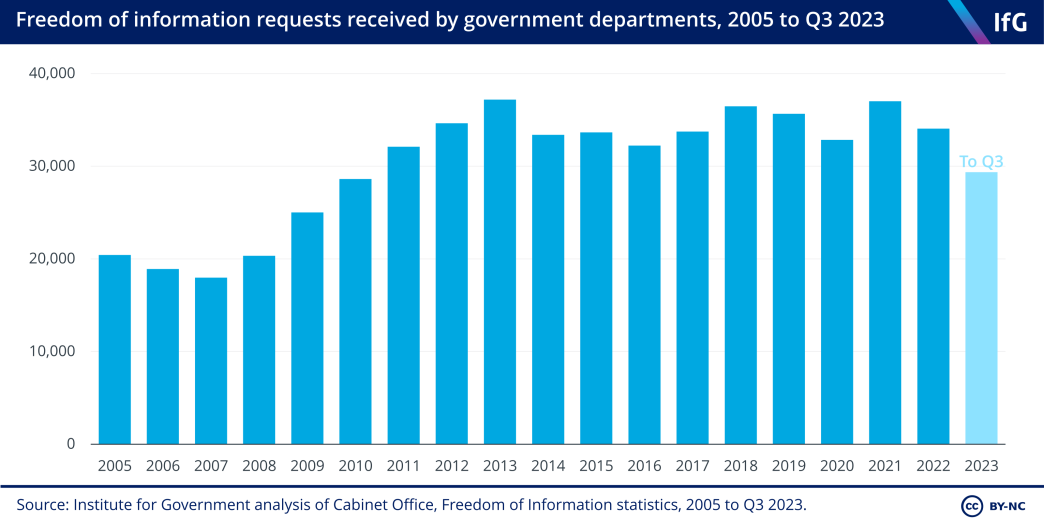
Government departments typically receive around 30,000 to 38,000 freedom of information requests in total every year. This has risen from about 20,000 per year from 2005 to 2008.
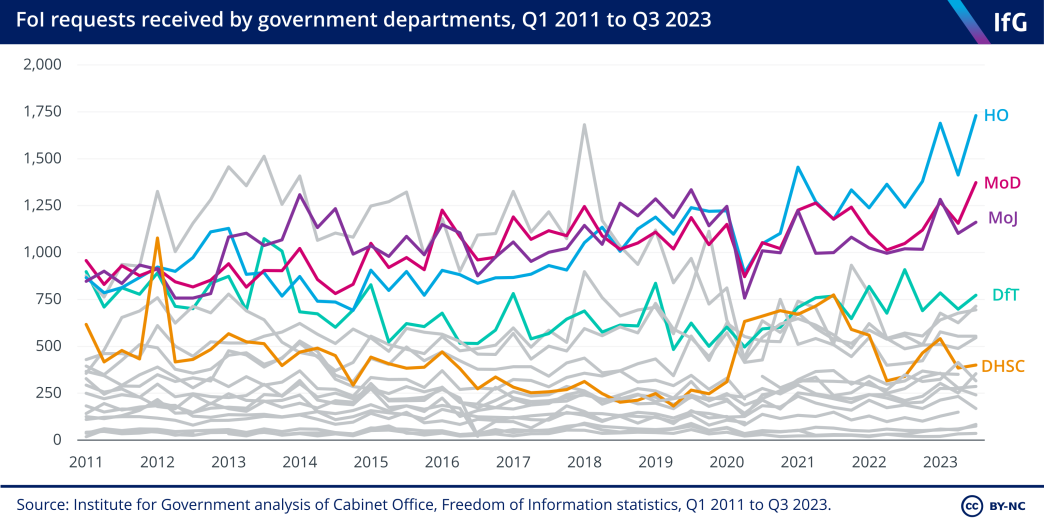
The departments that receive the most requests are the Home Office (HO), the Ministry of Defence (MoD) and the Ministry of Justice (MoJ), which routinely receive more than 1,000 requests per quarter. Following the outbreak of Covid-19 in the UK, the Department of Health and Social Care (DHSC) received a higher than usual number of FoI requests, rising from 311 to 633 between Q1 and Q2 2020.
How long do government departments take to respond to freedom of information requests?
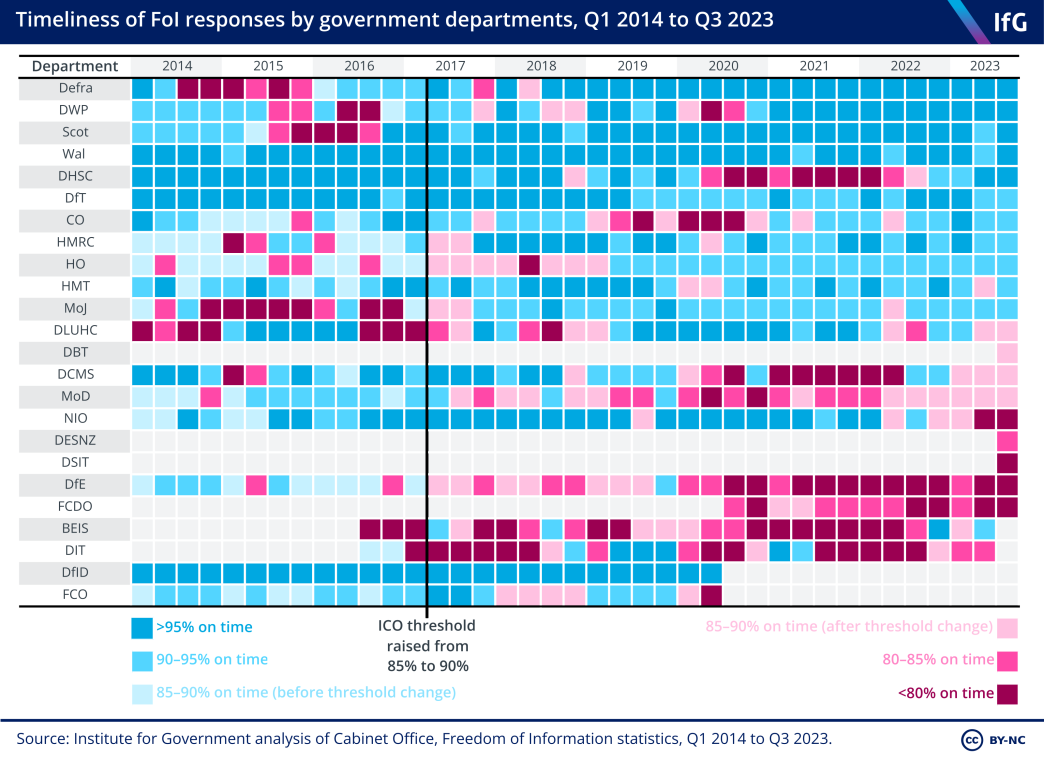
Public authorities are required to respond (or claim extensions to) FoI requests within 20 working days for their response to be considered ‘on time’. If a public authority does not meet this target for at least 90% of its FoI requests, the Information Commissioner’s Office may consider it for special monitoring. 40 Information Commissioner’s Office, Information Commissioner’s Annual Report and Financial Statements 2016/17, HC 137, The Stationery Office, 13 July 2017, p. 13
Only the Department for Transport (DfT), the Wales Office and the Scotland Office have consistently met this threshold since 2017. The Department of Health and Social Care has generally met the threshold, but fell below it for 10 quarters following the outbreak of the pandemic.
Other departments perform considerably worse. The Foreign, Commonwealth and Development Office (FCDO) has missed the 90% threshold in every quarter since it was formed out of the merger of the Foreign and Commonwealth Office (FCO) and the Department for International Development (DfID) in 2020. And in June 2023, the ICO issued an enforcement notice 41 The Information Commissioner’s Office issues enforcement notices in where there are “repeated and/or significant or systemic issues” with a public body’s obligations under the Freedom of Information Act. to the Ministry of Defence, requiring the department to respond to hundreds of requests that had passed the 20 working day deadline, including some dating back to 2018. 42 Information Commissioner’s Office, ‘“We are continuing to deliver for the public” – ICO publishes practice recommendations and enforcement notices on FOI’, 10 August 2023, ico.org.uk/about-the-ico/media-centre/news-and-blogs/2023/08/we-are-continuing-to-deliver-for-the-public-ico-publishes-practice-recommendations-and-enforcement-notices-on-foi/
Can public authorities refuse to answer FoI requests?
A public authority can only withhold information under specific circumstances, namely if: 43 Information Commissioner’s Office, ‘When can we refuse a request for information?’, [no date], retrieved 23 January 2024, www.ico.org.uk/for-organisations/foi-eir-and-access-to-information/guide-to-freedom-of-information/refusing-a-request/
- One of the 23 exemptions outlined in the Freedom of Information Act – covering things such as national security and personal information – can be applied.
- The cost limit for complying with requests is breached. Currently this is £600 worth of costs – generally staff time – for central departments, parliament and the armed forces. The cost limit is £450 for other public authorities such as local government.
- The request is deemed vexatious and is likely to “cause a disproportionate or unjustifiable level of distress, disruption or irritation”.
- The request is repeated, i.e. it is “identical or substantially similar” to a previous request by the same requester.
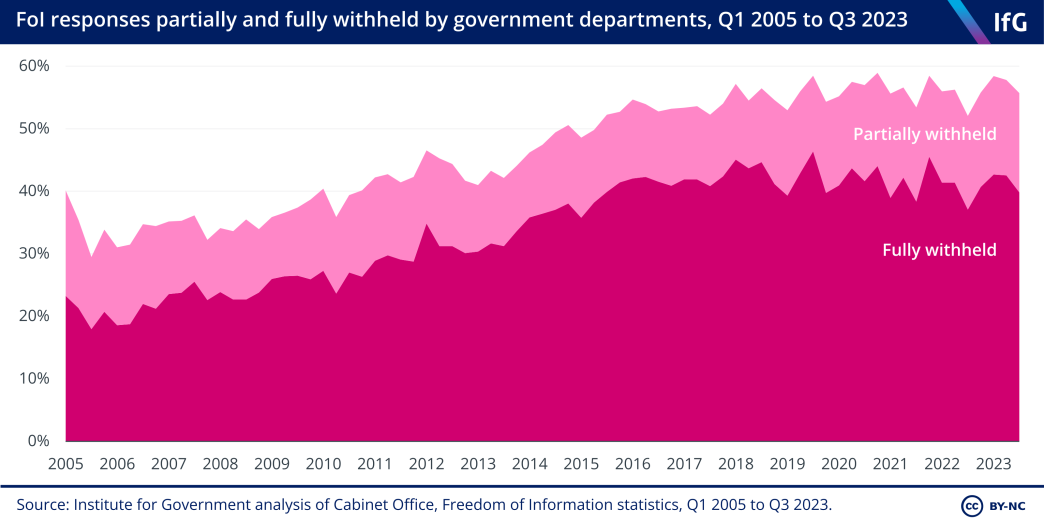
In recent years, government departments have fully or partially withheld the requested information an increasing amount of the time: up from around 40% of requests in 2010 to closer to 60%.
Some departments are more prone to withholding information – it has been more than a decade since the Cabinet Office (Q2 2006) and the Ministry of Justice (Q1 2009) released information in full in a majority of its FoI responses in a given quarter. The Foreign Office (both before and after its merger with DfID) has partially or fully withheld information in more than half of its FoI responses in every quarter since freedom of information was introduced. And some departments, such as Defra and DCMS, have progressively granted a lower proportion of freedom of information requests since the early 2010s.
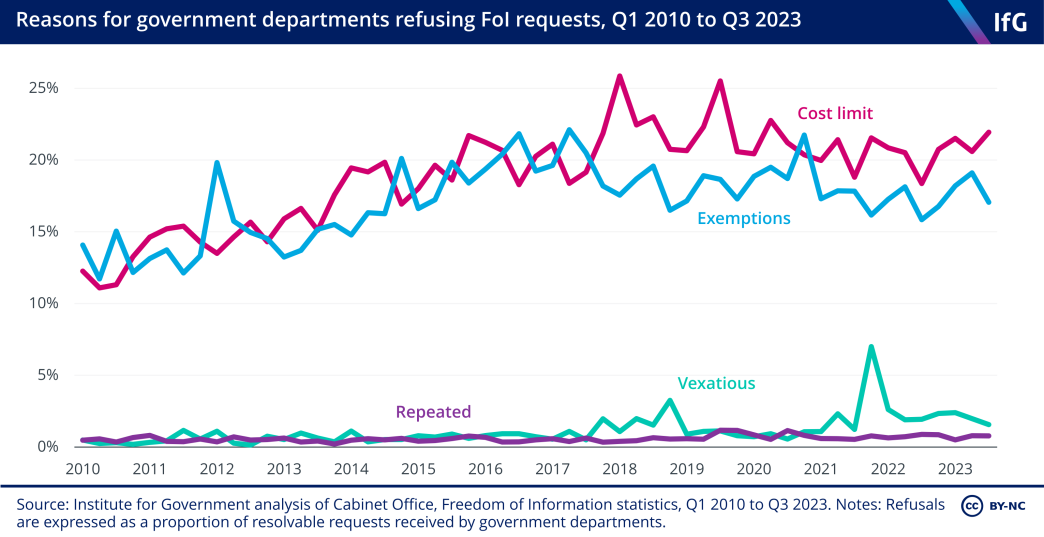
Cost limits and exemptions account for the vast majority of freedom of information requests refused by government departments.
The most commonly applied exemptions relate to requests for personal information, information that is intended for future publication and information that would prejudice law enforcement.
What happens if a freedom of information response is unsatisfactory?
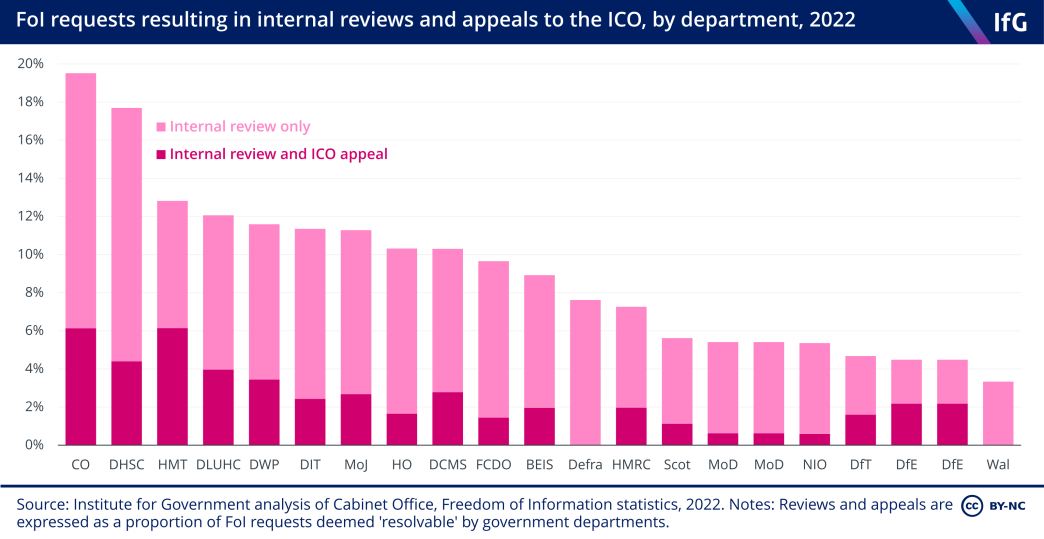
If a requester is unsatisfied with a public authority’s response, they can request an internal review. Appeals are first reviewed by the public authority itself, which decides whether to overturn its initial decision. In 2022, 10% of resolvable requests received by government departments led to an internal review – of these, 11% of reviews with a known outcome overturned the initial handling of the FoI request.
If the requester is unhappy with the internal review response they can make a complaint to the ICO, which makes a final decision on whether the public authority should disclose the information requested. In 2021 (the most recent year for which ICO appeal outcomes are available), 13% of complaints about a government departments’ response to an FoI request overturned the initial handling of the complaint . The Cabinet Office was the department with the highest proportion of contested FoI responses in 2022 – 13% of its resolvable requests went to internal review, and a further 6% resulted in a complaint to the ICO following an internal review . The department, which leads on freedom of information across government, has been criticised for its FoI practices by the Public Administration and Constitutional Affairs Committee. 44 House of Commons Public Administration and Constitutional Affairs Committee, The Cabinet Office Freedom of Information Clearing House: Ninth Report of Session 2021–22 (HC 505), 2022
Requesters unhappy with the outcome of a complaint to the ICO can appeal the decision to a tribunal.
- Keywords
- Accountability Government transparency
- Publisher
- Institute for Government